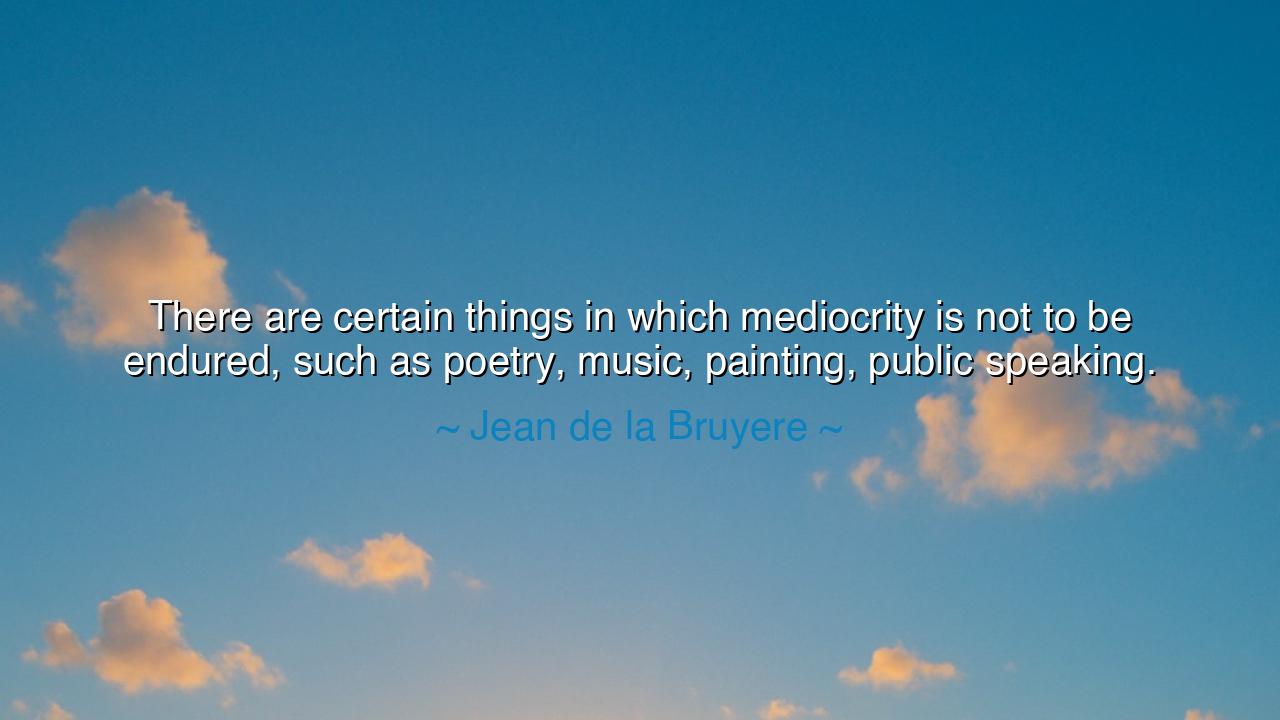
There are certain things in which mediocrity is not to be
There are certain things in which mediocrity is not to be endured, such as poetry, music, painting, public speaking.






When Jean de la Bruyère declared, “There are certain things in which mediocrity is not to be endured, such as poetry, music, painting, public speaking,” he spoke as one who understood that some domains of life demand greatness or else they collapse into nothingness. His words remind us that while in many labors mediocrity may suffice, in the realms of the arts and of speech, only excellence carries weight. For these are not tasks of survival alone, but of inspiration; not duties of the body, but nourishment for the soul. To endure mediocrity in such things is to pollute the very spring from which beauty and truth must flow.
The ancients believed this fervently. The Greeks exalted poetry as the voice of the gods, carried by Homer and Pindar to shape the destiny of entire peoples. The Romans, too, knew that oratory was the engine of power and persuasion: Cicero’s tongue held the fate of the Republic more surely than any sword. Would mediocrity have been tolerated in such sacred fields? Never—for mediocrity in these realms does not simply fail to please; it fails to move, to persuade, to awaken, which is their very purpose.
Consider the life of Demosthenes, who was mocked for his stammering and weakness of voice. Yet he would not accept mediocrity in the art of public speaking. He placed pebbles in his mouth to train his diction, recited verses against the roar of the sea to strengthen his voice, and through relentless effort transformed himself into the greatest orator of Athens. Had he settled for mediocrity, Athens might never have known his thunderous speeches against tyranny. His life proves Bruyère’s wisdom: in certain fields, mediocrity is worse than failure, for it leaves no mark at all.
So too with music. A poorly crafted melody does more than fall flat—it wounds the spirit. A singer who cannot carry truth in their voice does not merely bore the listener; they desecrate what should uplift. The ancients spoke of music as a force that could calm madness or incite armies to battle. How, then, could one permit mediocrity in such a sacred gift? Better silence than sounds without heart. Better a blank canvas than a painting that neither moves nor stirs.
Bruyère’s warning also carries a hidden challenge: in these noble crafts, to attempt half-heartedly is to insult not only the art, but the audience. A mediocre speech may mislead the people, a poor poem may deaden their imagination, a lifeless painting may desensitize them to beauty. In these fields, mediocrity breeds not indifference alone but bitterness, for the soul feels robbed of the transcendence it deserves.
The lesson for us is this: in the realms of expression—poetry, music, painting, public speaking—we must strive for truth, depth, and excellence, or else refrain altogether. Do not insult the sacred by offering the half-formed, the careless, or the empty. If you would write, then write with all your soul. If you would speak, let your words carry fire. If you would sing or paint, let it be with sincerity and mastery, not for vanity or applause. For in these crafts, the measure is not adequacy but greatness.
Practically, this means embracing discipline and humility. Do not fear hard labor, for only through it will mediocrity be transformed into excellence. Study the masters, refine your skills, and above all, seek authenticity. Mediocrity comes not only from lack of talent, but from lack of heart. Pour your spirit into your craft, and even if you do not achieve perfection, you will transcend mediocrity.
Thus, Jean de la Bruyère’s words endure like an admonition from the ancients: there are certain things in which mediocrity cannot be endured. Let us take this to heart, for in striving for excellence in art and speech, we do more than honor the craft—we honor humanity itself. Better no song than a false one, better silence than empty speech. But when greatness rises—when a poem, a song, a painting, a speech touches the soul—it carries the power to change hearts, nations, and time itself.






AAdministratorAdministrator
Welcome, honored guests. Please leave a comment, we will respond soon